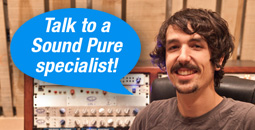-
Call Us Toll Free888-528-9703
-
Local/International (+1)919-682-5552
- Call Us! Toll Free! 888-528-9703
- Local / International (+1) 919-682-5552

Metric Halo ULN-8 Digital Audio Processor From Metric Halo
An all inclusive interface that has high quality preamps, converters, monitor management, and also includes Metric Halo's DSP plugins.
Manufacturer's Description from Metric Halo
At Home in Any Situation
ULN-8 is the perfect tool for capturing audio wherever inspiration hits, in the studio or on the road. Well suited to any recording situation, you can record and edit on the road, in the hotel, on the airplane, or wherever inspiration hits. Use 3 ULN-8s chained together for 24 tracks of live concert recording with processing on all channels in 3 rack spaces. Location sound engineers can now capture the moment — anywhere, anytime.
When you’re done recording, use the ULN-8 in the studio as an extremely high quality audio interface to transfer your tracks into a DAW. You’ll be amazed at the sound of this box! And weighing only 6 pounds, and a little larger than a laptop, you can be the first one out of the gig, with no hassle.
The ULN-8’s archival grade inputs and outputs, coupled with Metric Halo’s exclusive Character processing, provide flexibility and sound quality unavailable on any other interface. You can transition from a wire-with-gain to a gooey tube pre with one click of the mouse, and every input can have the right character for the material you are recording.
The ULN-8 is the only unit in its class with an on-board processing engine that supports fully instantiable processing, allowing you to use Metric Halo’s world-renowned signal processing effects without sacrificing your computer’s processing power or introducing any additional latency in your monitor path. From MIOStrip to HaloVerb, the ULN-8 comes with a full +DSP license that provides all the basic production processing you need — and more. And remember, this one rack space audio interface has the ability to run entirely from any DC power source (16V-30V), making it truly and completely mobile.
Organically Scalable
A unique feature of the Mobile I/O system is that MIO’s work well individually or as a group. Mix and match ULN-8 with 2882 and ULN-2 units to create a system that meets your needs for track count and preamp power. Adding a unit to the system organically increases the DSP power of the system, so that your DSP always scales with your I/O. Break your system up for small gigs when playing out or add the units of your mates to build a huge system when required. By standardizing on the Mobile I/O platform, each member of the band can have ultimate quality while working alone, and the band can have huge track counts when playing together. You can’t lose!
Stand-alone Operation
Flexible signal routing and sophisticated patch and preset management systems as well as a comprehensive set of front panel controls are also featured in the ULN-8. The ULN-8’s front-panel controls allow the unit to function equally as well as a stand-alone Mic Pre/Converter system. In standalone mode, the ULN-8 operates with the converters directly routed to and from the AES I/O, and the analog domain sends allow purely analog operation of the preamps.
As a standalone converter, the ULN-8 provides a 24bit/192kHz eight channel front-end with 8 world-class boutique-quality ULN mic pres for any recording system. It also functions seamlessly as an analog monitor controller, making it ideal as a digital headphone amp and studio monitor controller.
Applications
The ULN-8 supports a variety of applications. For studio recording, it provides a very high quality interface to a DAW, offering sound processing or simple file transfer between workstations. Its exceptional sound quality makes it perfect as any studio’s primary analog to digital conversion and monitoring chain. Songwriters and engineers can use the ULN-8 to record and edit on the road, in the hotel, while traveling, or anywhere that inspiration strikes.
The ULN-8 is suitable for broadcast applications, too. It offers instant playback of 8 individual stereo sends for music cues or sound effects, or smaller numbers of surround stems. The compact package and portable power features mean that the unit can go anywhere users need to work, and make on-site fixes or edit location recordings without the need to send files back to the studio, saving valuable time before air.
In the live performance arena, in addition to operating as a remote recorder for archiving performances or to play out backing tracks and musical cues, the ULN-8 can operate as a soft-synth mixer and I/O interface.
ULN-8: Built upon the 2d DSP Processing Platform and MIO Console 5

The ULN-8 is built upon the 2d Card — a massive DSP processing engine that forms the nerve center of the ULN-8. The 2d Card provides a substantial amount of DSP power to drive the zero-latency mixing and processing environment that is integrated in the ULN-8 and also provides 8 channels of 192k AES I/O.
Future Proof
In 2001 we introduced the 2882 and called it “Future Proof”. Nine years later, while the competition has obsoleted multiple generations of products, the 2882 is still arguably one of the best FireWire interface available on the market... until the introduction of the ULN-8. In 2003, we released the ULN-2, with the finest preamps available in any interface... until the introduction of the ULN-8. With the release of the 2d Card and v.5, we delivered yet again on our commitment to making “Future Proof” products that stand the test of time. The ULN-8 is the next entry in our line-up of Future Proof products.
While other manufacturers churn you with the special of the day, we build products that preserve your investment and deliver for you year after year and project after project. It is our philosophy and we take it seriously.
Includes the Integrated v.5 Mixer
Included with every ULN-8, the v.5 Mixer is a completely customizable mixing engine. You can create custom mixers either from scratch or start with any of the templates we've included to get you started quickly. With the v.5 Mixer, your ULN-8 can be a mastering console in the morning, a tracking console in the afternoon, and a live sound mixer/recorder in the evening. Whatever the application, you can configure an elegant custom setup.
Not a mere computer interface cue mixer, the v.5 Mixer is a sophisticated Digital Console built into the the ULN-8. With support for mono to 7.1 mixing, multiple busses, arbitrary sends, insertable zero-latency plug-in processing, completely customizable mults, and Metric Halo’s exclusive Character, the v.5 Mixer is limited only by your imagination. And, it is completely phase compensated, no matter how complicated the routing is.

“I have the ULN-8 wired into my rack and I use it every single day. The Metric Halo v.5 software/hardware is like having an analog console in a 1-U box. The combination of hardware and software is unmatched in it's routing flexibility. With processing available on every track, I can mix anywhere!”
— Charlie Pilzer
Grammy Award winning Mastering Engineer and Producer
Latency-Free, Time-Aligned Mixing Architecture

The v.5 Mixer is based upon the +DSP graph technology originally designed for +DSP. Since the +DSP graph provides infinite routing and multing capabilities with integrated latency compensation, the addition of full access to all I/O resources means that everything can go everywhere in the ULN-8, with the unique benefit that all signal paths are automatically time-aligned. This has incredible implications — you can route anything anywhere and never have to worry about routing delays. All sends and busses are automatically realigned with the primary bus, bringing back analog simplicity to parallel routing, with digital simplicity in set up and recall.
The v.5 Mixer manages all of the plug-ins and connections within the DSP for you. So, even though you may be creating an incredibly complex network of plug-ins with many mults and bus to bus routes, the user interaction required for you to control the system is simple and direct.

The v.5 Mixer works as complex routing manager, adding plug-ins (including mixer plug-ins) to the DSP based upon your configuration commands. Because the DSP engine automatically configures the runtime environment to compensate for routing latency in the configured DSP graph, you can rely on the fact that bus to bus routes all arrive with no routing latency. This allows you to configure sub-mixes and stems, including sub-bus processing, without having to worry about phase-cancellation problems or other latency related issues.
Author of Logic Pro 8 Power
Direct Insert of Plug-ins

With the v.5 Mixer, you can now take advantage of a sophisticated direct insert model. Just insert the plug where you want to process the signal. Done!

v.5 Mixer Direct Plug-in Insert (in the inserts!)
Of course, with the included +DSP license, you are not limited to simply putting plugs in inserts and simple linear routing of Plug-ins. You can always insert a +DSP graph in any insert in the mixer to add a routing playground, allowing you to split, mult, parallel and feedback signals to your heart’s content. And then you can save the graphs as your own “Secret Weapons” - instantly instantiable with two mouse clicks.
Multi-Bus Mixing

The v.5 Mixer allows you to create an arbitrary number of busses (limited only by the capabilities of your hardware) — each of which can be used as a master bus (routed to an output) or an aux bus (routed to other busses). Each bus is dynamically adjustable from mono to 7.1 surround. The busses can be mapped directly onto the main control UI or driven by sends. Basically, make the mixer what you need it to be. And multiple busses of multiple types are supported at all sample rates. Unlike some other products on the market, all inputs can be routed to all busses (even mults of any input), so you won’t be limited in what you can mix.

Transparent Recordings
Sends

As mentioned above, any input can be sent to any bus. Sends are simply inserted in any insert slot, which means that you can send pre or post processing. Each send can be pre or post fader, so it can track the mix of the main UI or it can be used as a completely independent send. Every bus in the system can be returned to any other bus in the system, so you can use the busses as internal auxes, mix-minus feeds, PFL busses, etc. Anything you can think of, you can accomplish with the flexible routing engine in the v.5 Mixer. The v.5 Mixer provides an innovative send window that gives you a consolidated view of all the sends for the selected bus with a full sized fader for the send level, per-bus solos and channel mutes, and support for any width send bus (that’s right — you can send to a surround bus!).


About Manufacturer
Metric Halo provides the world with high-resolution metering, analysis, and processing solutions with award winning software and hardware. As an industry leader, Metric Halo has developed a product line so powerful and versatile, its applications range from live sound reinforcement, CD/DVD mixing and mastering, film and broadcast production to forensic science, airline safety investigation, medical research, and designing the next generation Ferrari and BMW automobiles.
Specifications
ULN-8 Specifications
| Rails | |
| Preamp Rails | ±15.8 Volts |
| Analog Rails (low power) | ±9.9 Volts |
| Analog Rails (high power) | ±12.6 Volts |
| Phantom Power | 48 ± 0.1 Volts |
| Max Phantom Current Per Mic | 10 ma |
| Maximum I/O Levels (Balanced) | |
| Peak Line Output @ 0 dBFS (no jumper/low power) | +18.5 dBu |
| Peak Line Output @ 0 dBFS (output jumper/low power) | +22.0 dBu |
| Peak Line Output @ 0 dBFS (output jumper/high power) | +24.5 dBu |
| Analog Send Max Output | +21.5 dBu |
| Mic Pre Max Input | +20 dBu |
| Line In Max Input | +24.5 dBu |
| Output Impedance | 5 Ω |
| Monitor Controller | |
| Nominal FS output (Balanced) Output Jumper Off | -19.0 dBu |
| Nominal FS output (Balanced) Output Jumper On | -12.0 dBu |
| Maximum Output | Same as Line |
| Gain Range | -96 dB to +30 dB |
| Gain Precision | ±0.05 dB |
| Gain Step | 0.5 dB |
| Mic Pre Input + ADC | |
| Input Impedance | 3.3 kΩ |
| Dynamic Range (-60 dB, flat 0-22.05 kHz, typ) | 115 dB |
| Dynamic Range (-60 dB, A-weighted, typ) | 118 dB |
| Noise Floor (flat 0-22.05 kHz, typ) | 115 dB |
| Noise Floor (A-weighted, typ) | 117.9 dB |
| Gain Range | -22 dB to +91.5 dB |
| Gain Precision | ±0.05 dB |
| Gain Step | 0.5 dB |
| THD D/A/A/D loop @ -12 dBFS | 0.0007 % |
| THD D/A/A/D loop @ -12 dBFS +12 dB Gain | 0.0015 % |
| THD D/A/A/D loop @ -0 dBFS | 0.0023 % |
| Crosstalk @ 1kHz | -110dB |
| IMD 1k component (19 kHz/20kHz @ +8dBu) | -104 dBu |
| EIN @ 60 dB Gain (150Ω Source Impedance) | -130.50 dBu |
| EIN @ 60 dB Gain (0Ω Source Impedance) | -133.25 dBu |
| Analog Send Calibration (ADC = 0 dBFS) | +21.5 dBu |
| Phantom Power (Switchable Per Channel) | +48 Volts |
| Mic Pre + ADC Frequency Response | |
| +0/-0.1dB @ fs = 44100 Hz | 8.9 Hz - 20.5 kHz |
| +0/-1.0dB @ fs = 44100 Hz | 2.9 Hz - 21.0 kHz |
| +0/-0.1dB @ fs = 96000 Hz | 8.9 Hz - 43.9 kHz |
| +0/-1.0dB @ fs = 96000 Hz | 2.9 Hz - 45.4 kHz |
| +0/-0.1dB @ fs = 192000 Hz | 8.9 Hz - 42.1 kHz |
| +0/-1.0dB @ fs = 192000 Hz | 2.9 Hz - 64.7 kHz |
| 5° low-end in-channel phase deviation point | 20.0 Hz |
| Interchannel phase 0 Hz - 20 kHz | < ±0.05° |
| Crosstalk from SMPTE Input | < -142 dB |
| Line Input + ADC | |
| Input Impedance | 10 kΩ |
| Dynamic Range (-60 dB, flat 0-22.05 kHz, typ) | 115 dB |
| Dynamic Range (-60 dB, A-weighted, typ) | 118 dB |
| Noise Floor (flat 0-22.05 kHz, typ) | 115 dB |
| Noise Floor (A-weighted, typ) | 117.9 dB |
| THD D/A/A/D loop @ -12 dBFS | 0.0005 % |
| THD D/A/A/D loop @ -0 dBFS | 0.0015 % |
| Crosstalk @ 1kHz | -127 dB |
| IMD 1k component (19 kHz/20kHz @ +8dBu) | -104 dBu |
| Gain Range | -12 dB to +31.5 dB |
| Gain Precision | ±0.05 dB |
| Gain Step | 0.5 dB |
| Line Input + ADC Frequency Response | |
| +0/-0.1dB @ fs = 44100 Hz | 5.7 Hz - 20.5 kHz |
| +0/-1.0dB @ fs = 44100 Hz | 1.8 Hz - 21.0 kHz |
| +0/-0.1dB @ fs = 96000 Hz | 5.7 Hz - 43.9 kHz |
| +0/-1.0dB @ fs = 96000 Hz | 1.8 Hz - 45.4 kHz |
| +0/-0.1dB @ fs = 192000 Hz | 5.7 Hz - 42.1 kHz |
| +0/-1.0dB @ fs = 192000 Hz | 1.8 Hz - 64.7 kHz |
| 5° low-end in-channel phase deviation point | 10.7 Hz |
| Interchannel phase 0 Hz - 20 kHz | < ±0.05° |
| Crosstalk from SMPTE Input | < -142 dB |
| Input Processing | |
| M/S Decode | Instantiable |
| Parametric EQ | Instantiable |
| Dynamics | Instantiable |
| Limiting | Instantiable |
| Character | Instantiable |
| Transient Control | Instantiable |
| Reverb | Instantiable |
| Delay | Instantiable |
| Nearly Infinite Combinations via +DSP | Instantiable |
| Output Processing | |
| M/S Encode | Instantiable |
| Parametric EQ | Instantiable |
| Dynamics | Instantiable |
| Limiting | Instantiable |
| Character | Instantiable |
| Transient Control | Instantiable |
| Reverb | Instantiable |
| Dither | Instantiable |
| Mix Foldown | Instantiable |
| Signal Generation | Instantiable |
| Nearly Infinite Combinations via +DSP | Instantiable |
| Front Panel | |
| Indicator LEDs (Bicolor) | 495 |
| Meters | 16 |
| Segments per Meter | 15 |
| Channel Encoder Knobs | 8 |
| Encoders Have Shaft Push Buttons | Yes |
| Monitor Controller Encoder Knobs | 1 |
| Monitor Controller Mute | Yes |
| Monitor Controller Dim | Yes |
| Indicators Per Encoder | 16 |
| Sample Rate Indicators | 6 |
| Clock Source Indicators | 4 |
| AES Clock Source Indicators | 4 |
| AES Lock Indicators | 4 |
| AES Input Signal Indicators | 4 |
| AES Output Signal Indicators | 4 |
| System Lock Indicator | 1 |
| Firewire Indicator | 1 |
| Front Panel Modes | 14 |
| Headphone Output (Dedicated DAC) | TRS Stereo |
| DI Inputs (2) | TRS Balanced |
| DI Input Impedance | 10 MΩ |
| DI Input Fixed Gain (Jumper Selectable) | 0/10/20 dB |
| DI Input Variable Gain | -12 dB to 31.5 dB |
| Power Switch (Jumper Defeatable) | Toggle |
| Back Panel | |
| MIDI Connectors (In and Out) | 5-Pin DIN |
| SMPTE Connectors (In and Out) | Balanced TRS |
| Word Clock Connectors (In and Out) | 75Ω BNC |
| AES Connector (8 Channels In and Out) | DB-25 |
| AES Connector Pinout | Tascam/Digidesign Digital |
| Mic Input Connector (8 Channels) | DB-25 |
| Mic Input Pinout | Tascam/Digidesign Analog |
| Line Input Connector (8 Channels) | DB-25 |
| Line Input Pinout | Tascam/Digidesign Analog |
| Send Output Connector (8 Channels) | DB-25 |
| Send Output Pinout | Tascam/Digidesign Analog |
| Line/Monitor Output Connector (8 Channels) | DB-25 |
| Line/Monitor Output Pinout | Tascam/Digidesign Analog |
| Line/Monitor Mult Output Connectors (Analog 1/2) | TRS Balanced |
| FireWire Connectors (2) | 1394a 6-Pin |
| Power (Unswitched) | 2.1mm Coaxial |
| Power (Switched) | 4-Pin XLR |
| Security Slot | Kensington |
| Software | |
| Driver | CoreAudio Mac OS X |
| Mac OS X | 10.3.9 or newer |
| Architectures | PPC, Intel |
| MIO Console | Included |
| Record Panel | Included |
| LTC Decoder | Included |
| Mixer | Included |
| +DSP License | Included |
| Power | |
| Voltage | 14v - 28v |
| Power | 32 Watts |
| FireWire Bus Powerable | No |
| Passes FireWire Bus Power | Yes |
| Supplies FireWire Bus Power | No |
| External Supply (Input) | I00-240VAC |
| External Supply (Max Input Current) | 1.2 A |
| External Supply (Output) | 24 VDC |
| External Supply (Max Output Current) | 2.0 A |
| External Supply Connector | 4-Pin XLR |
| Case | |
| Material | Powder Coated Aluminum |
| Fasteners | 3mm Phillips Head |
| Weight | 6 lbs |
| Weight | 2.7 kg |
| Dimensions | 17" x 13" x 1.72" |
| Dimensions | 432 x 330 x 44 mm |
| Rack Ears (included) | Powder Coated Steel |
| Rear Rack Mounts | Available |
























